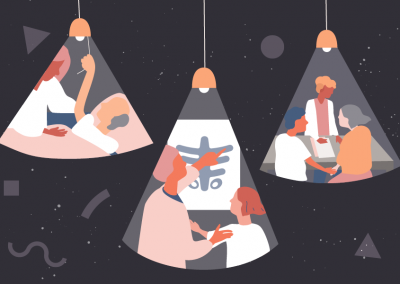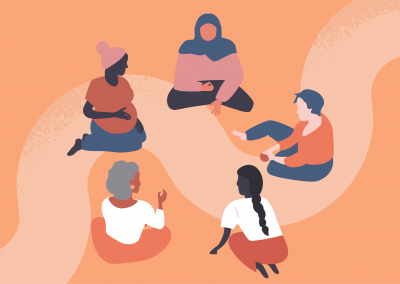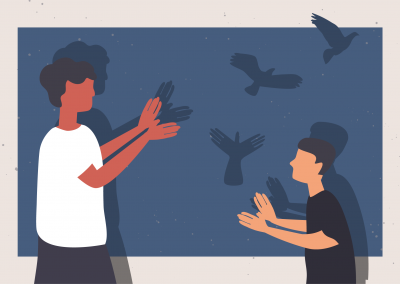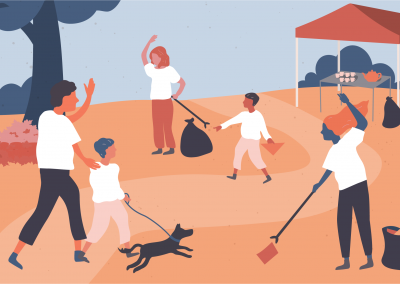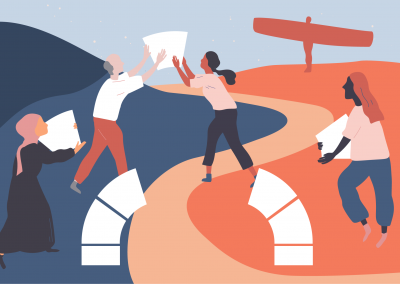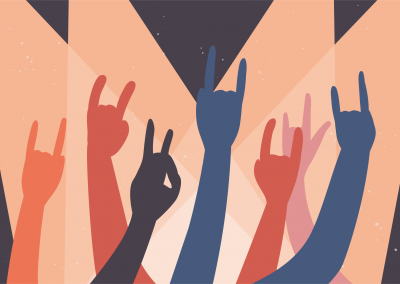Switchback
Transforming the lives of prison-leavers through reliable relationships
Note: some names in this story have been changed
In prison, people get ‘gate happy’ when they have a release date. ‘There’s an energy in the prison,’ says Alice Dawnay, co-founder of Switchback. ‘Big talk about all the drugs and all the girls and all the cars; the younger men boast they’ll be a billionaire footballer or win a TV talent show.’
‘Everybody knows it’s a massive lie. But the officers and everyone play into it.’
‘By contrast, we come in and say: the day you get released the most likely story is that some of your possessions are missing; the friends who said they would collect you don’t show up; it’s raining and you don’t know how to get back to London. And the men laugh, because they recognise that picture, even if everyone’s spent all this time saying it’s going to be rainbows and happy days.’
‘Once we’ve established that, we can have a real conversation about what will happen,’ Alice says, ‘and that honesty will become the foundation of a trusting relationship.’
Both sides of the gate
When we first started in 2007, we were trying to do something quite radical – to provide something everyone knows you need in order to change your life: a long-term relationship with somebody who cares, which is flexible but boundaried enough to hold you through that transition.
Switchback mentors work with young men before and after their release from prison to support them to live differently. ‘They’re people who’ve been let down time and time again with relationships,’ Alice says. ‘Relationships aren’t something they can rely on. We set out to flip the script in that regard and offer a reliable relationship.’
‘Resettlement organisations tend to have a prisons team and a community team,’ says Alice, ‘which will be connected, but it’s not the same person. We wanted to be there both sides of the prison gate.’
‘The premise is that if you are a young man in that situation, very often you’ve pretty much given up on yourself,’ Alice says. ‘You might have committed acts of serious violence and done things you can’t really do if you care about other people or yourself. We seek to remedy that through a relationship where somebody really cares and, through which, these young men can begin to care about themselves again.’
The relationships are ‘very much at the heart of the work’. In a sense, they are the work.
Breaking vicious cycles
There are many practical and emotional challenges on leaving prison. The mentor-trainee relationship provides a backdrop and a container for these challenges – a point of stability in an unstable period and, for some, a space to experience and practise having a caring, reliable relationship.
Practical outcomes flow from relational outcomes. Through being encouraged and challenged within a trusting relationship, the young men achieve practical goals like opening a bank account, getting ID and finding employment. Mentors support with these practical matters, but just as importantly they support trainees to work on attitudes, values, behaviours and relationships.
The results are striking. Many young men released from prison reoffend within a year of their release. For Switchback trainees this figure is 8%, compared to a national average of 49%. This is a staggering difference. Eighty percent of Switchback trainees move into long-term employment. They are breaking notoriously stubborn cycles.
A mutual decision
A distinctive feature of Switchback’s model is that their trainees have to actively opt in to their support. They don’t apply, they aren’t chosen, they aren’t persuaded. Instead there’s a shared commitment by both mentor and trainee. ‘It’s always a mutual decision,’ says Annabel Holmes, a current mentor. ‘We both have to agree it’s the right thing.’
‘A lot of people expect to just sign up and that’s it, after a very short conversation,’ says Annabel. ‘They’re like: Oh yeah, sign me up for that. But I’ll say: We don’t make quick decisions. If you’re interested, have a think about it, we can decide together that it’s the right thing.’
The decision has to be active and intentional. ‘Having the mutual decision, knowing they’ve made a choice to be there, enables the men to have more agency,’ says Annabel.
Taking it slow
‘I get a list of guys who are eligible for the support, approach them and explain what we do,’ says Annabel. ‘If they don’t want it or don’t think they need it, I leave it there. If someone is curious or interested, I start building a relationship.’
Time to build relationships is designed in.
I’ll go into the prison once a week over three months,’ says Annabel. ‘I take it slow, get to know their situation, what kind of goals they have when they get out, what’s been difficult in the past, what stability means to them, and how we can ensure the support we’re offering will help them get there.
There is something countercultural about this spaciousness. The idea of giving things the time they need, rather than the time you have, will sound radical and luxurious to many frontline workers. Can they afford to give each individual this much attention?
Flexing to individual needs
Switchback’s model flexes to individuals and their needs, enabling mentors to begin where trainees are and adjust their time and support accordingly.
‘One guy I worked with was very nervous coming to Switchback,’ says Annabel. ‘It took a few attempts to get him into the office.’
‘He’d had a very difficult upbringing, and had a hard time trusting people, so a lot of my work with him was centred around building rapport and safety. When he felt overwhelmed, I’d let him take a breather, and we’d go again, to try and show him I wasn’t going anywhere, while still giving him time to feel comfortable.’ It was challenging at times, but I had to remind myself he was only trying to do what he could to keep himself safe.’
’When it came to the end of his time on the programme, he’d grown so much. At the end of the intensive twelve weeks, we do a final action plan, where we celebrate the journey, give them a printout of all of their achievements, and a card and gift. I wasn’t sure if he was going to come, but he did and it was great. He was so taken aback by the thought we’d put into it. And now he’s working and doing really well.’
Annabel’s relationship with her trainee enabled multiple outcomes – one of which was practising how to build and maintain relationships.
For Annabel, part of the relational skill is being able to keep an emotional distance. ‘’It takes a lot of reflection,’ she says. ‘I have to look at what I am seeing as part of a bigger picture, taking into account all of that person’s past experiences. I have to step out of it so it doesn’t just become reaction, reaction, reaction.’
Good endings
Practising how to build and maintain relationships also involves practising how to give relationships a good ending.
Many of the young men we work with have no experience of relationships ending well or feeling in control of how those endings happen. Every single one of them has experienced the traumatic ending inherent in being sent down to prison from court. Traumatic endings to relationships are very familiar to those who’ve been in care in particular.
The time-bound relationship with Switchback offers the chance to break that pattern and bring a relationship to a positive, careful conclusion. To do this, mentors help trainees to prepare for the end of that relationship from early in the process, so it doesn’t come as a shock or leave them feeling let down. Key to this is helping trainees build up other relationships which will endure.
Doing what you say
Sometimes mentors initiate this ending mid-process. A distinctive feature of Switchback is the conditionality of the relationship between mentor and trainee – and their openness to ending relationships if a trainee consistently does other than they say they’re going to do.
‘There’s unconditional positive regard,’ says Alice. ‘It doesn’t matter what they’ve done, we’re working with them on who they have the potential to be. But the relationship is conditional on them wanting to make a big change in their life. If they stop wanting that, we have a conversation about stopping that relationship.’
Sarah, Switchback’s Acting Head of Delivery, echoes this: ‘If the gap between what someone does and what they say they want keeps widening, then we have a frank conversation about whether Switchback is the right thing for them at this time.’
Part of the role of the mentor is to ‘model and coach reliability’.
At Switchback there’s only one rule, across staff, trainees and everybody,’ Alice says, ‘and that is: do what you say you’re going to do. That’s the core of how we work with anybody.
In this way, Switchback mentors hold trainees to their own stated intentions. ‘The way we challenge people,’ says Sarah, ‘is just to say: You told me that you wanted this. You said you’d meet me in the council office every day. We’ll do that. You said you’d bring in your passport so we can send it off to housing. Let’s do that.’
‘If I see a difference between someone’s actions and their words’, says Annabel, ‘I’m not going to judge it, but I’m going to point that out.’
Being yourself with boundaries
Prisoners come into contact with many different services and charities. ‘Most of the external agencies come to see you with a clipboard and ask you the same question that seventy-two people have already asked you that month,’ says Alice. ‘Whereas we come in, put the form down and say How are you? What’s going on? And it’s like: Oh, hang on, this feels more like a human being. I don’t have to give this person the “right answer”. They’re surprised into having a more real relationship.’
Mentors are trained how to be themselves, without having to share a lot of personal information. Relationships are ‘incredibly boundaried’, Alice says. ‘Switchback mentors are quite unusual in how highly boundaried they are. We’ve done a lot of training on how to build strong relationships whilst maintaining boundaries.’
‘Once you start a relationship like that you realise you don’t need to tell people where you live or what football team you support in order to build rapport,’ Alice says. ‘You can be yourself without giving anything about yourself away.’
Positionality and power
As well as being themselves, mentors need to be aware of themselves.
Effective relational work requires a strong sense of self and positionality in society. You need to know and understand and reflect on your position and power in that relationship.
‘It’s important in my work to recognise I am a white middle-class woman,’ says Sarah, ‘and to ask myself: for a man who has been to prison, what does it feel like to work with me and someone who looks like me? I have to be mindful of who I am and who I’m talking to and that there are certain things I won’t know about or ever experience’.
‘People come to charities for support,’ Sarah continues, ‘and acknowledging that there’s a power imbalance in that relationship is imperative.’ The intrinsic power imbalance is one reason Sarah believes it’s crucial there are people with lived experience on Switchback’s team. ‘Building and delivering a service without people’s lived experience could be quite harmful,’ she says. ‘You could be missing out a big part of the work in supporting someone.’
Sarah describes how her relational work has changed across her time at Switchback. ‘My empathy looks different now,’ she says. ‘When I started it came from a place of: Oh no, this is so horrible, poor you. Now I approach it with a much more stepped-back lens of: What do you want? And how can you support yourself? It’s thinking about how to navigate that without trying to teach someone to live like a white middle-class person.’
‘There’s been a positive shift over the years in understanding that, whilst we do really meaningful work, there is a limit to change if society doesn’t change,’ Sarah says. ‘The way we hold conversations now is more about acknowledging that some things are out of the men’s control (such as being stopped and searched through being stereotyped) and being real about how hard and frustrating that can feel.’
The stuff we all need
Switchback deliberately flies in the face of existing logics and expectations around funding and timescales.
‘When we set it up,’ says Alice, ‘we wanted to work the way you would if you didn’t have to worry about where the next funding was coming from, or the way this has been done before: if you were providing properly meaningful support focussed on individual need and ambition for young men leaving prison; if you were going to aim for excellence, being honest and unencumbered by funding or justice system structures. We were just like: No, we’re going to tell the truth about what these guys are up against and why this needs to happen.’
‘Our fundraising is relational as well,’ she continues. ‘The funders, like the prison-leavers, respond to the honesty. They recognise that they’re not being fed a line. It matters to us that it’s meaningful; funders come to the training café or come to events and meet the trainees and chat with them. Everyone feels very connected. Ultimately nothing at Switchback works if it isn’t human: that’s our first value.’
When we talk to funders, we’re upfront about how this is going to be expensive because it’s about humans and complexity. We talk about not seeking government funding that would demand high-volume and light touch. Our work is the opposite: narrow and deep. If that means small caseloads, but massive ripple effects in families and communities, then that’s the way we’ll do it.
Emerging from prison can be highly destabilising. Every aspect of life is off balance. Having to sort out work, accommodation, finances, health and relationships all at once could overwhelm anyone. ‘We believe that people need what people need,’ says Alice. ‘It’s not Because I’m a prisoner, or an “ex-offender”, or had a childhood in care, or did this awful deed that I need something special or different. What these guys need is what we all need, it’s the same stuff.’
To bring life back into balance, what they need, above all, are reliable, trusting, caring relationships.
Reflection questions
Digging deeper
- What stands out for you about the relational practice here?
- How do you feel about the conditional nature of the relationships in this story? What effect might those conditions have within this relational work?
- Why is a consideration of positionality and power so important for this relationship centred practice?
Applying the learning
- How and where do boundaries play a role in relationships in your context?
- How do you reflect on positionality and power in relational work in your context?
More stories
The Relationships Map
The Relationships Map is a space for anyone who believes in the importance of relationships to find one another, share ideas and resources, feel part of something bigger, and realise more than the sum of our parts.

